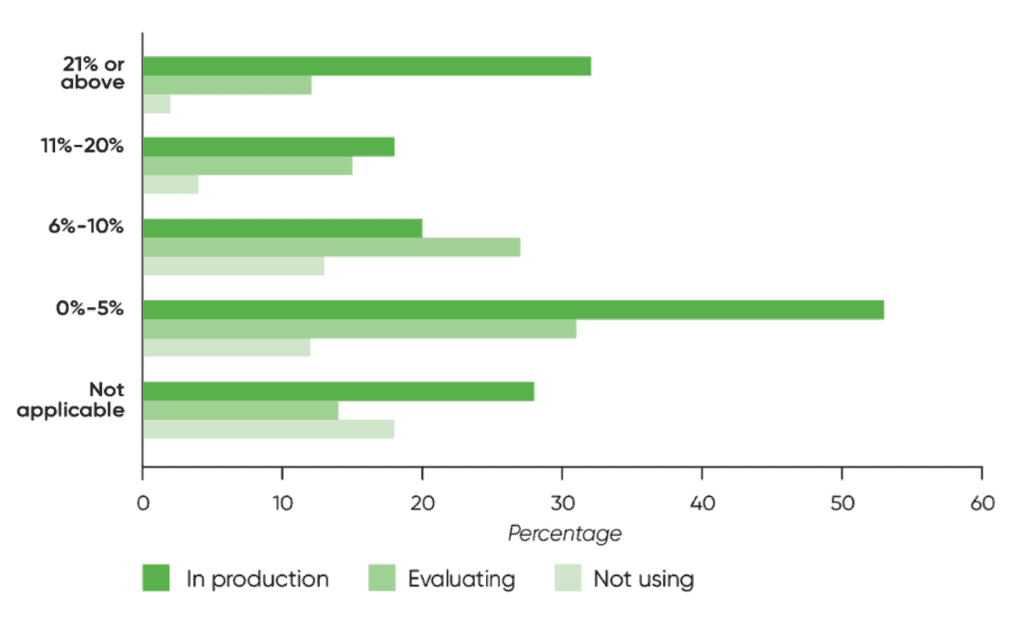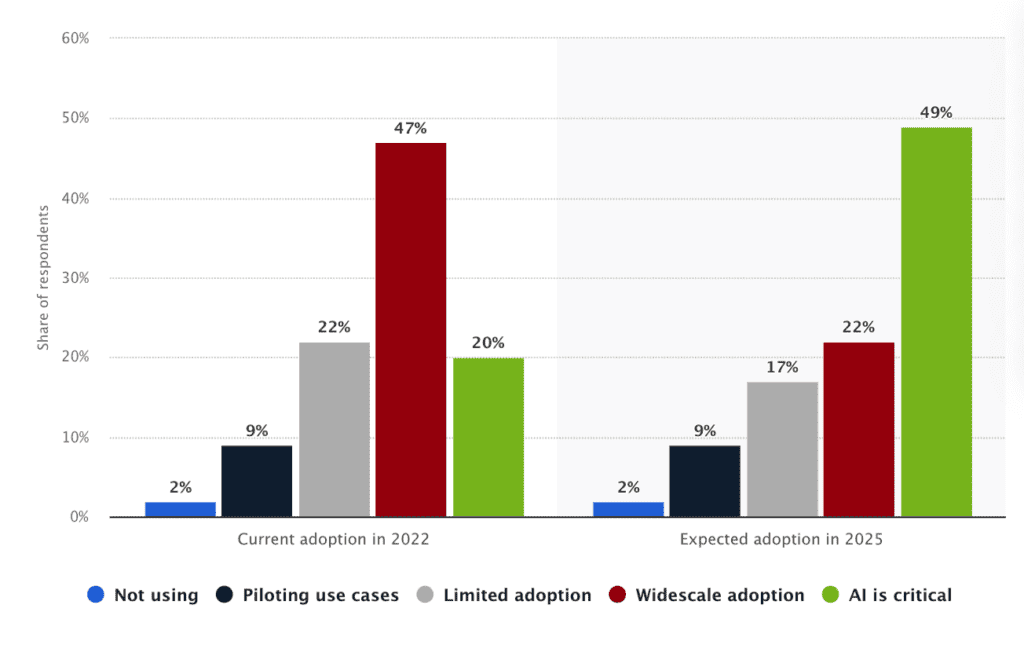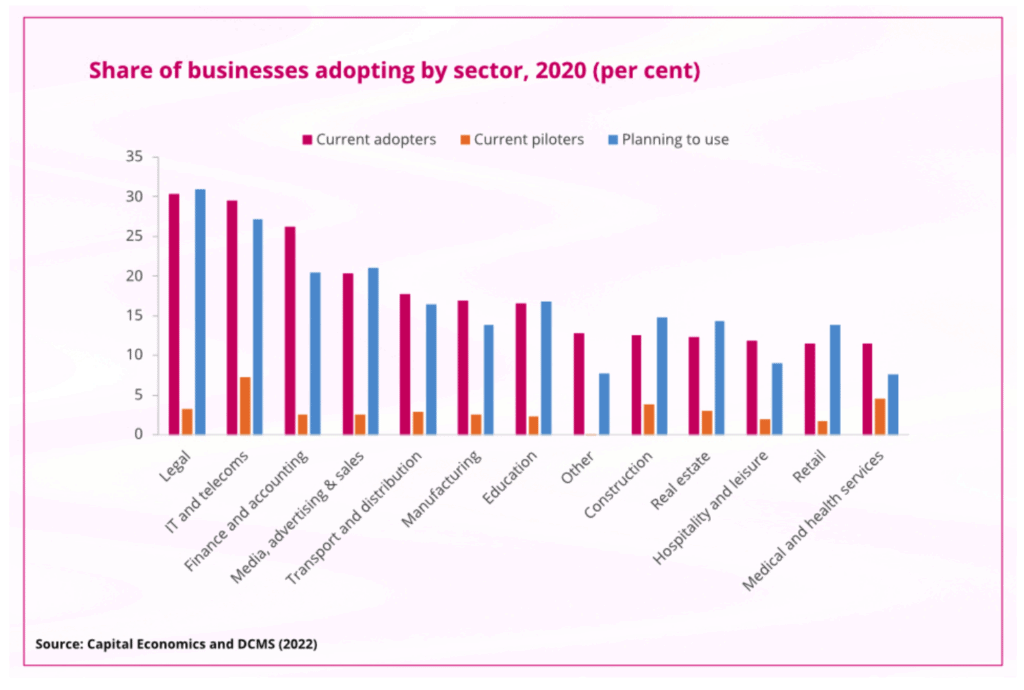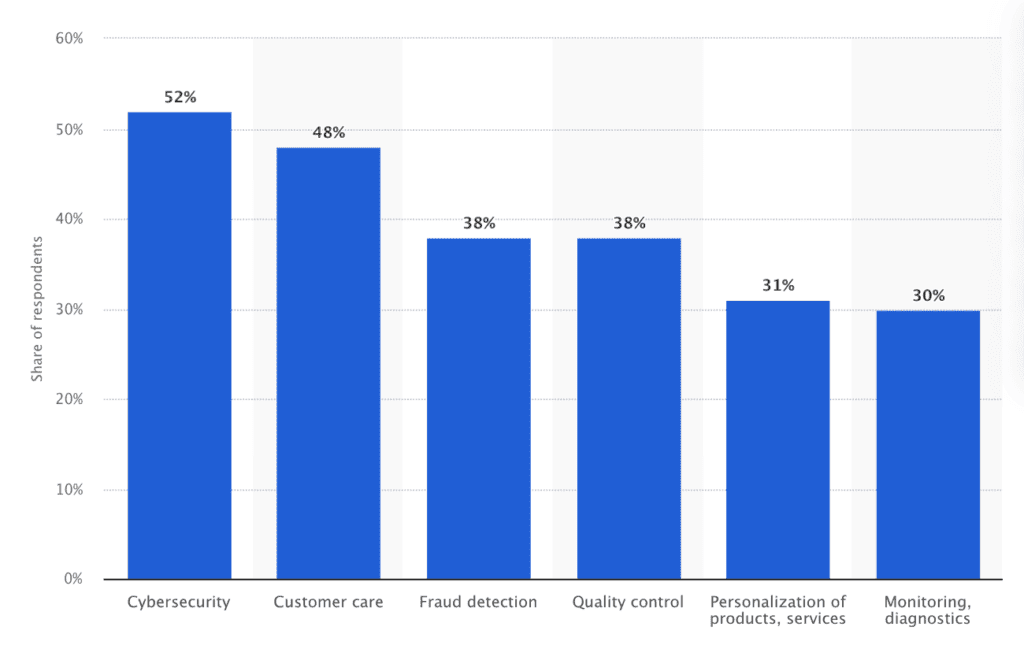AI in IT Industry Statistics 2023 [Adoption, Market Size, Benefits]
In this article, we’re diving into the fascinating realm of AI in IT industry statistics.
Artificial Intelligence has been making waves in technology, and its impact on the IT sector has been nothing short of revolutionary.
From transforming how businesses operate to enhancing customer experiences, AI is a game-changer that can’t be ignored.
So now, let’s take a look at some eye-opening statistics that shed light on the rapid growth and transformative power of AI within the IT landscape.

Top AI Statistics in IT Industry
- 63% of organizations in the IT and telecom sectors make use of artificial intelligence.
- 53% of worldwide IT organizations in 2022 said that their usage of AI had risen during the preceding two years.
- 80% of technology executives perceive AI as a means to boost productivity and create new job opportunities within their organizations.
- The majority (85%) of IT professionals believe that companies that are transparent about their AI model development, management, and usage are more likely to be preferred by consumers.
- AI and automation are acknowledged to impact the operations of 81% of professionals across various industries.
- According to Info-Tech Research Group, 44% of private sector companies have plans to invest in AI systems in 2023.
- A survey conducted by the MIT Technology Review reveals that 81% of executives consider AI to be a significant competitive advantage for their businesses.
- 27% of executives have expressed intentions to invest in AI-based cybersecurity measures for their organizations.
- Within the technology, media, and telecommunications industries, 72% of businesses expect AI to have a substantial impact on their product offerings within the next five years.
- The adoption rate of AI in the UK stands at 30% for IT and legal firms.
- In 2021, 76% of enterprises had prioritized AI and Machine Learning in their IT budgets.
- 37% of executives cite managers’ lack of understanding of emerging technologies as the main obstacle to AI implementation in their organizations.
- 97% of users of computerized devices engage with AI on a regular basis.
- 17% of the AI projects listed were attributed to businesses in the technology industry.
Market Size of AI in the IT Industry
The global artificial intelligence (AI) market size reached USD 69.25 billion in 2022 and is projected to reach approximately USD 1,871.2 billion by 2032, exhibiting a compound annual growth rate (CAGR) of 39.1% from 2023 to 2032. The deep learning segment based on technology, dominates the AI market with a 39% market share in 2022 (Precedence Research)
The artificial intelligence (AI) market has witnessed significant growth in recent years, with the global market size valued at USD 69.25 billion in 2022. Looking ahead, the market is expected to experience exponential expansion, reaching an estimated value of around USD 1,871.2 billion by 2032.
This substantial growth can be attributed to several factors, including the increasing adoption of AI technologies across various industries, advancements in deep learning algorithms and techniques, and the rising demand for automation and intelligent solutions. Within the AI market, the deep learning segment has emerged as a dominant technology, capturing a significant 39% market share in 2022.
The Impact of AI Investment in the IT Industry
The impact of AI investment in the IT industry is significant, shaping the business landscape and driving transformative change.
32% of respondents whose organizations currently had AI projects in production reported spending more than 21% of their total IT expenditure on AI (O’Reilly Media, Inc.)
In companies with AI in production, a significant portion of the IT budget is allocated to AI initiatives. 32% of respondents reported spending over 21% of their IT budget on AI, while 18% allocated 11-20% and 20% allocated 6-10%. Among those evaluating AI, only 12% spent over 21% of the IT budget on AI projects. Interestingly, even among companies not using AI, some allocated a substantial portion of their IT budget to AI, with 2% spending over 21%. These findings suggest that organizations, including those on the back side of the adoption curve, are exploring AI and experimenting with its potential.

Accelerated AI Adoption in the IT Companies
With the rapid advancements in artificial intelligence, organizations are increasingly recognizing its potential to drive innovation and gain a competitive edge. This trend of accelerated AI adoption among businesses, including IT companies, is revolutionizing the way businesses operate and paving the way for transformative advancements in various industries.
Global IT Companies Experience 53% Accelerated AI Adoption in 2022 (IBM)
The adoption of AI in the IT industry has experienced a notable acceleration in recent years. According to IBM, in 2022, a significant 53% of IT companies worldwide reported that they had accelerated their AI adoption over the past two years. This statistic highlights the growing recognition among IT organizations of the transformative power and potential benefits that AI technologies bring to their operations.
Comparatively, in 2021, the percentage of IT companies that reported accelerated AI adoption was 43%, indicating a significant increase in AI adoption rates within just one year. This upward trend suggests a strong industry-wide momentum towards leveraging AI to enhance efficiency, drive innovation, and gain a competitive edge in the ever-evolving IT landscape.
The information technology sector (IT) is projected to witness rapid growth in the adoption rate of artificial intelligence (AI), with nearly 47% of IT executives expecting wide-scale AI adoption in their companies by 2022 (Statista)
The IT sector is set to rapidly adopt AI, with nearly 47% of IT executives expecting widescale implementation by 2022. This reflects growing recognition of AI’s transformative potential in driving innovation and efficiency, fueling digital transformation.

AI adoption rates stood at 30% for IT and legal firms, 17% for manufacturing companies, and 12% for retail and hospitality companies in the UK (Capital Economics report)
According to the Capital Economics report, AI adoption rates were 30% for IT and legal firms, 17% for manufacturing companies, and 12% for retail and hospitality companies in the UK. These statistics demonstrate the varying levels of AI adoption across sectors, highlighting the growing recognition of its potential in driving innovation and efficiency within different industries.

Applications of AI in the IT Industry
AI applications in the IT industry have revolutionized operations, spanning automation, predictive analytics, natural language processing, and cybersecurity. These advancements drive efficiency, inform decision-making, and fuel innovation, transforming how organizations leverage technology.
52% of respondents from the IT and telecommunications industries consider cybersecurity as the most valued use case of artificial intelligence, followed by customer care at 48% (Statista)
Respondents from the IT and telecommunications industries have identified cybersecurity and customer care as the most highly valued use cases of artificial intelligence. A significant 52% of respondents highlighted cybersecurity as the top use case, emphasizing the critical importance of leveraging AI to enhance security measures in an increasingly digital world.
Similarly, 48% of respondents recognized customer care as a significant application of AI in their industry. The adoption of AI in customer care operations is particularly vital for companies in the telecommunications sector, as it enables improved customer experiences while driving cost efficiency.

| Use cases of AI | Share of Respondents |
| Cybersecurity | 52% |
| Customer Care | 48% |
| Fraud Detection | 38% |
| Quality Control | 38% |
| Personalization of products, services | 31% |
| Monitoring, diagnostics | 30% |
Benefits of AI in the IT Industry
In the IT industry, the adoption of AI brings a range of benefits. From increased efficiency and productivity to cost savings, AI technologies offer automation and intelligent systems that streamline operations. With data-driven decision-making, enhanced cybersecurity, and opportunities for innovation, AI is transforming the IT landscape.
75% of companies believe AI enables entry into new businesses and ventures, while 80% of tech leaders see it as a means to boost productivity and create new jobs (MyComputerCareer)
The potential of Artificial Intelligence (AI) is highly regarded by companies and tech leaders alike. An impressive 75% of companies believe that AI will open doors for them to venture into new business domains and opportunities.
Moreover, approximately 80% of tech leaders see AI as a catalyst for increasing productivity within their organizations and creating new job roles. The optimistic outlook extends to executives as well, with 79% expressing that AI will streamline their job functions, making them more efficient.
Furthermore, a notable 36% of respondents consider the liberation of workers from mundane tasks as a primary objective of AI, allowing them to concentrate on more creative and strategic endeavors. These statistics underline the widespread confidence in AI’s ability to drive innovation, productivity, and improved job satisfaction across various industries.
Read our latest AI in jobs statistics.
30% of IT professionals worldwide have reported that their employees are already benefiting from time savings through the implementation of new AI and automation software and tools (IBM)
Approximately 30% of IT professionals worldwide have reported that their employees are already saving time through the use of new AI business software and tools. This adoption has streamlined processes, automated repetitive tasks, and optimized productivity. By leveraging AI and automation, IT professionals can allocate more time to strategic activities, enhancing operational efficiency and resource allocation.
Future of Artificial Intelligence in the IT Industry
The future of AI in the IT industry holds immense potential for transformation and innovation. It is set to revolutionize operations, optimize processes, and reshape job roles. Get ready to explore the exciting prospects that AI brings to the future of IT.
55% of data science professionals and IT platform owners anticipate a significant impact from generative AI on their business in the next one to two years, while 45% believe the impact will surpass current expectations (TechRepublic)
Over half (55%) of data science professionals and IT platform owners anticipate a significant impact from generative AI on their businesses within the next one to two years. Additionally, 45% of respondents believe that the impact of generative AI will surpass current expectations, indicating a rising level of excitement and potential for this technology. These statistics highlight the growing recognition and anticipation of the transformative power of generative AI in various industries.
AI in IT Industry Statistics Wrapping Up
The statistics surrounding AI in the IT industry for 2023 reveal a rapidly evolving landscape with substantial transformative potential. AI’s impact spans various sectors, with the technology industry at the forefront, witnessing a significant 63% adoption rate.
With 80% of technology executives recognizing AI’s capacity to boost productivity and create new job opportunities, it becomes evident that organizations are embracing AI as a catalyst for innovation.
Moreover, the global AI market size, valued at USD 69.25 billion in 2022, is projected to soar to around USD 1,871.2 billion by 2032, driven by the dominant deep learning segment. These numbers underscore AI’s profound influence in shaping the IT industry’s future, propelling businesses towards enhanced efficiency, data-driven decision-making, and a competitive edge in the digital era.
References
- IBM Global AI Adoption Index 2022. (2022). IBM – United States. https://www.ibm.com/downloads/cas/GVAGA3JP
- Loukides, M. (2022, March 31). AI adoption in the enterprise 2022. O’Reilly Media. https://www.oreilly.com/radar/ai-adoption-in-the-enterprise-2022/
- Webster, M. (2023, May 25). 149 AI statistics: The present and future of AI [2023 stats]. AuthorityHacker. https://www.authorityhacker.com/ai-statistics/
- CarlosV. (2022, January 19). The future of IT and artificial intelligence. MyComputerCareer. https://www.mycomputercareer.edu/news/the-future-of-i-t-and-artificial-intelligence/
- Crouse, M. (2023, June 29). Data scientist survey: Do tech leaders believe the AI hype? TechRepublic. https://www.techrepublic.com/article/data-scientist-survey-ai-hype/
- AI use casesin IT and telecoms worldwide 2020. (2020, April 27). Statista. https://www.statista.com/statistics/1197957/ai-it-telecoms-use-case-worldwide/
- Columbus, L. (2017, September 10). How Artificial Intelligence Is Revolutionizing Business In 2017. Forbes. https://www.forbes.com/sites/brittanylewis/2023/06/30/if-republicans-nominate-trump-we-are-willingly-reelecting-biden-will-hurd-on-forbes-road-to-2024/?sh=718a4bcf6256
- Global AI adoption rates within IT business 2022. (2022, September 20). Statista. https://www.statista.com/statistics/1346631/global-ai-function-adoption-rates-business-it/
- Eliaçık, E. (2022, August 22). The ultimate combination of success: AI & IT. Dataconomy. https://dataconomy.com/2022/08/22/artificial-intelligence-and-information-technology/
- Authors: Artificial intelligence statistics & facts for 2023. (n.d.). Authors. https://scalar.lehigh.edu/authors/artificial-intelligence-statistics–facts-for-2022
- Korobeyko, T. (2023, January 25). The ultimate list of machine learning statistics for 2023. Itransition: Software Development Company. https://www.itransition.com/machine-learning/statistics
- Rigas, M. (2019, June 17). PMI Study Identifies Six AI Technologies Impacting Project Professionals. Project Management Institute. https://www.pmi.org/about/press-media/press-releases/pmi-study-identifies-six-ai-technologies-impacting-project-professionals
- AI activity in UK businesses: Executive summary. (2022, January 12). GOV.UK. https://www.gov.uk/government/publications/ai-activity-in-uk-businesses/ai-activity-in-uk-businesses-executive-summary
- Zauderer, S. (2023, June 30). Artificial intelligence statistics & facts for 2023. Life-Changing ABA Therapy – Cross River Therapy. https://www.crossrivertherapy.com/research/artificial-intelligence-statistics
- Pegg, J. (2023, April 6). 70+ top AI statistics 2023-24: Market, users, ChatGPT, GPT-4. Find Web3. https://findweb3.com/posts/ai-statistics?gclid=Cj0KCQjwnf-kBhCnARIsAFlg490egy0oGyTVN49y3eC0HdsJRdbLXGEEOt55rR1DBh5y2UXKOZF1h-waAnEvEALw_wcB
- Artificial intelligence market size, growth, report 2022-2030. (n.d.). Precedence Research – Market Research Reports & Consulting Firm. https://www.precedenceresearch.com/artificial-intelligence-market
Patryk Miszczak

